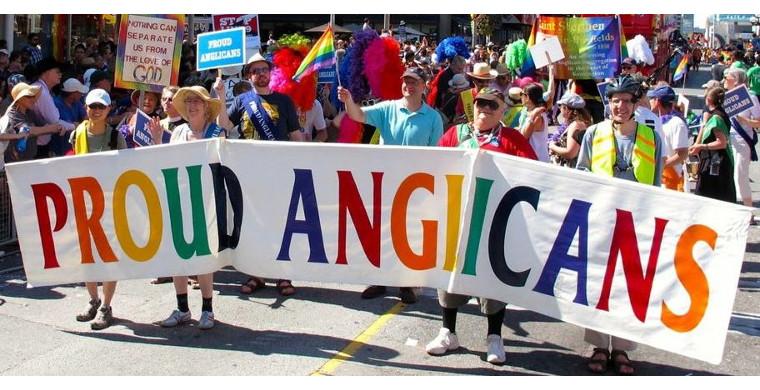Proud Anglicans Kick off Season of Gay Pride Parades in Canada
By Jonathan Widell
Special to Virtueonline
www.virtueonline.org
June 6, 2019
June 28, 2019 will mark the 50th anniversary of the Stonewall riots in New York City in 1969. The riots that followed a police raid were the beginning of what is called LGBT liberation. The anniversary has galvanized the usual suspects in the Anglican and Episcopal churches in North America.
The Anglican Parish of St. Francis Winnipeg has given us a foretaste of what to expect this summer as it participated in last week's events in its hometown. Winnipeg, the capital of the Province of Manitoba, was also the scene of the yearly 10-ten-day LGBT pride festival, called the Pride Winnipeg Festival, which took place from May 24 to June 2, 2019. The media reports called the landmarks along the route "iconic". The march kicked off at the Manitoba Legislative Building, the scene of the first Winnipeg pride demonstration, and continued down Portage Avenue, through Portage and Main, which is called the "crossroads of Canada" because of its central latitudinal location in the country, and ended at Waterfront Drive.
The Facebook page of the Anglican Parish of St. Francis has 28 photos celebrating its participation in the event. Particularly interesting is the tagline "Proud Anglicans! Marching with all of our siblings in Christ! God IS Inclusive!" These words provide a key to the mystery behind this insolent affront to orthodoxy and other expressions of traditional faith. On the other hand, they also provide the critics with ammunition to confront that affront.
"Proud Anglicans!" Let us give St. Francis the benefit of the doubt: pride is not the same thing as hubris here but more akin to a rallying cry of a football team. If so, who is the adversary, if not the so-called traditionalists and other so-called bigots? However, let us turn this around and suppose that pride, especially THIS kind of pride is a virtue -- pretty much like giving alms. Jesus told us: "When you give alms, do not blow a trumpet before you..." (Matthew 6:2) And no matter how endearing vindictiveness, call it pride or something else, can sometimes be, Jesus also said: "Blessed are the poor in spirit." (Matthew 5:3)
"Marching with all of our siblings in Christ!" True, but it is also true that you are marching with all your siblings who are not in Christ, as well. Some of your partners are indifferent or hostile to Christ. So what do you mean by "Christ" exactly? Besides, if you are marching with ALL your siblings in Christ, the implication is that those who are not marching with you, for whatever reason, are not your siblings in Christ, which in turn implies that you have denied your siblings although they would probably refer to themselves as your "brothers and sisters".
"God IS inclusive!" This is also true to a certain point: "He causes his sun to rise on the evil and the good, and sends rain on the righteous and the unrighteous." (Matthew 4:45) But inclusivity indicates a fundamental misunderstanding of most of Jesus' parables. In one of them, Jesus says of the unfaithful servant that the master "will cut him in two and appoint him his portion with the hypocrites. There shall be weeping and gnashing of teeth." (Matthew 24:51) It is also in this spirit that the Apostle Paul said of a man guilty of sexual sin at Corinth: "And you are proud! Shouldn't you rather have gone into mourning and have put out of your fellowship the man who has been doing this?" (1 Corinthians 5:2)
In the same letter, Paul asked the Corinthians: "Or do you not know that wrongdoers will not inherit the kingdom of God?" (6:9) The exact meaning of different kinds of wrongdoing in the list that follows has been the subject of much debate and "exegesis". It shouldn't be. However, whatever some items mean, this is not a list of inclusion but exclusion.
It would have made more sense to quote Jesus' words "Do not judge, or you too will be judged." (Matthew 7:1) That would at least have been Biblical, insofar as that matters at this point. Then the only question one would have had in one's mind would Paul meant by his words in 1 Corinthians 6:3-4: "Do you not know that we will judge angels? How much more the things of this life!"
Jonathan Widell got his Doctor of Civil Law degree from McGill University in 2012. An alumnus of the Montreal Diocesan Theological College, he currently works as an independent researcher and a legal translator.














